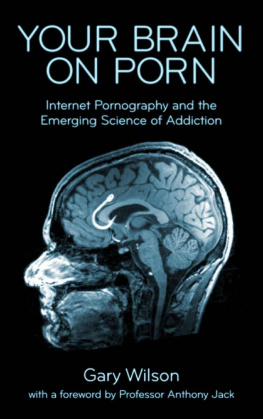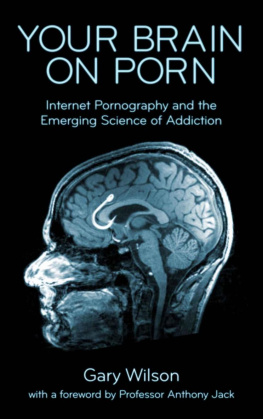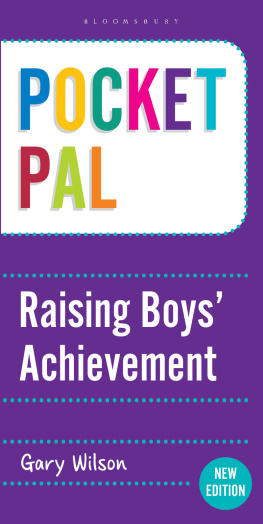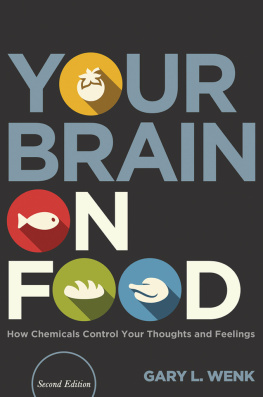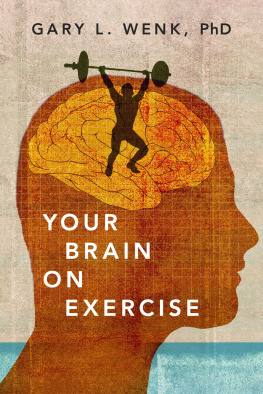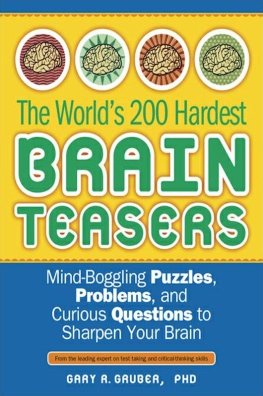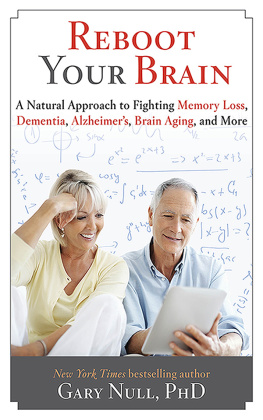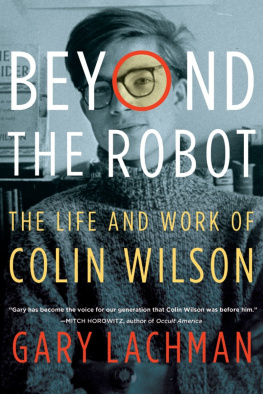Gary Wilson - Your Brain on Porn
Here you can read online Gary Wilson - Your Brain on Porn full text of the book (entire story) in english for free. Download pdf and epub, get meaning, cover and reviews about this ebook. year: 0, genre: Science. Description of the work, (preface) as well as reviews are available. Best literature library LitArk.com created for fans of good reading and offers a wide selection of genres:
Romance novel
Science fiction
Adventure
Detective
Science
History
Home and family
Prose
Art
Politics
Computer
Non-fiction
Religion
Business
Children
Humor
Choose a favorite category and find really read worthwhile books. Enjoy immersion in the world of imagination, feel the emotions of the characters or learn something new for yourself, make an fascinating discovery.
- Book:Your Brain on Porn
- Author:
- Genre:
- Year:0
- Rating:5 / 5
- Favourites:Add to favourites
- Your mark:
- 100
- 1
- 2
- 3
- 4
- 5
Your Brain on Porn: summary, description and annotation
We offer to read an annotation, description, summary or preface (depends on what the author of the book "Your Brain on Porn" wrote himself). If you haven't found the necessary information about the book — write in the comments, we will try to find it.
Your Brain on Porn — read online for free the complete book (whole text) full work
Below is the text of the book, divided by pages. System saving the place of the last page read, allows you to conveniently read the book "Your Brain on Porn" online for free, without having to search again every time where you left off. Put a bookmark, and you can go to the page where you finished reading at any time.
Font size:
Interval:
Bookmark:
Your Brain On Porn
Internet Pornography and the Emerging Science of Addiction
Gary Wilson
Your Brain on Porn
Copyright Gary Wilson, 2014
All rights reserved. No part of this publication may be reproduced or transmitted, in any form or by any means, without permission.
Cover design by Kieran McCann.
The moral rights of the author have been asserted.
The information contained in this text is not intended, nor implied, to be a substitute for professional medical advice. It is provided for educational purposes only. Always seek the advice of your physician or other qualified healthcare provider before starting any new treatment or discontinuing an existing treatment. Talk with your healthcare provider about any questions you may have regarding a medical condition. Nothing contained in this text is intended to be used for medical diagnosis or treatment.
Commonwealth Publishing
c ommonwealth-publishing.com
For A. Masquilier, whose selflessness and foresight made possible the open dialogue that continues to fuel recoveries by the thousands .
Contents
Neuroscience, the Internet and the Good Life
Professor Anthony Jack
The human mind is shaped by the intersection of two powerful forces: biology and culture. Cultural changes, in particular technological innovations, profoundly alter how we think. Yet these changes do not occur on a blank slate. The brain is a highly plastic, flexible organ. But it is also an accident of evolution, with numerous constraints. The written word, for example, has transformed our ability to understand the world, greatly accelerating changes in technology and fundamentally changing human consciousness. Yet, unlike verbal language, reading and writing do not emerge spontaneously from human sociability. Literacy only reliably arises as the product of well-organized social institutions dedicated to education.
Literacy requires training that alters the basic wiring of the brain. It takes serious work to organize neurons into a highly efficient specialized system that links visual processing to the verbal language system and manual motor outputs. Sustained and guided attention changes the structure of the brain and endows it with new powers.
The great promise of the rapidly advancing field of human neuroscience is that it can help us to understand how cultural contexts interact with the brain to create the mind - how behaviours and ways of thinking inscribe themselves inside our skulls. It gives us a new way to put human consciousness under the light of scientific understanding. Neuroscience offers guidance that can help us fulfill our potential and avoid pitfalls along the way.
But we mustnt fool ourselves that this emerging science will deliver quick and easy fixes fixes like taking a pill, having surgery, or passing laws severely restricting what others are allowed to do . The best way to train our plastic brains to work effectively in their cultural context is through education, inquiry and contemplation, a process that takes a lot of time and patience.
The widespread availability of high-power computers, coupled with high-speed internet connectivity, has ushered in an era of technological change whose capacity to shape human consciousness is comparable to the invention of the printing press. The internet is now everywhere. It is not just in the office buildings of the most developed countries, but also, through smartphones, in the hands of individuals of all ages everywhere. Information is flowing around the world at a quantity, speed, and with a lack of barriers that represents a sea-change from the past. This revolution is changing not just the information we have access to, but the very nature of how we ask questions (we google it), and the process we use to answer them: thinking is now as much a task shared with computers as a purely brain-based activity.
In recent years there has been widespread concern about the impact of the internet on our social lives. The internet offers wonderful opportunities for people to connect in new and meaningful ways, yet it also threatens to make us socially disconnected. Many of us have hundreds of friends on Facebook whom we interact with online at the cost of face-to-face interactions. Research has shown this often has a negative effect on our well-being. Technology is in danger of making us impersonal, of dampening our capacity and tendency for human connection.
Perhaps the most important example of the way that digital technology allows us to withdraw from ordinary interaction is pornography. In a healthy relationship, sex is associated with the highest levels of intimacy and trust. It is, or at least can be, the culmination and expression of our closest human connection. It not only helps to reinforce this connection, it also creates entirely new life. Evolution shaped this basic human drive to build families: sexual desire is one of our most powerful motivational forces, and has been essential to the flourishing of the human race. Yet pornography transforms that drive into a force that primarily motivates the completely solitary and unproductive activity of masturbation.
Pornography has been present since before the dawn of civilization, and can be found on the walls of cave dwellers. Yet, it has never been less social, or more pervasive. It is well known that pornography has been the single most influential economic engine that has fuelled the expansion of the internet, including internet commerce. It is accessed in massive quantities on both computers and, more recently, smartphones, not just in the USA but increasingly across the entire world.
As a result of the internet revolution, young people dont need to physically purchase pornographic content or obtain it from friends. The current cultural environment provides massive amounts of varied content that can be accessed for free and in complete privacy. Anyone with a high-speed internet connection can, if they choose, access more sexually arousing content in a few hours than the most obsessive and wealthy collector of a few decades ago could have amassed in a lifetime.
Finally, pornography represents the most important cautionary tale of how the internet can make us impersonal because of a great irony. It turns out that sex is such a personal issue that we are reluctant to speak about it in public. We dont like to say so out loud, but the internet exists in its current form because it is, in large part, a collection of technologies that make access to pornography more convenient. Pornography is shaping the private consciousness of people all over the world, probably including most of the people you know, in a way that is quantitatively and qualitatively different from the past. It is past time for that private influence to become a subject for public deliberation.
Let me take a moment to clearly state what I believe is the best approximation of the truth, on a topic where objectivity is notoriously difficult. Addiction to internet pornography is a very real phenomenon with a very real impact on well-being. It is a phenomenon which has grown exponentially in the last decade, even though it has remained largely invisible and undetected by society. Tragically, its risks continue to be ignored or actively denied by all but a few enlightened medical professionals. It is a phenomenon that is not just here to stay, but also likely to increase. It is almost certainly the cause of the widespread sexual dysfunction found in rec ent studies of late adolescence. It is a problem that is most likely impacting you, or your loved ones, without you even being aware of it.
The core of this book comes from the blend of two things: scientific evidence and human experience. Pornography is as old as civilization, but this book provides a scientific account of why internet pornography is having a qualitatively and quantitatively different effect from most prior pornography. This scientific account is made vivid by the first hand reports of people who have been badly impacted by, and found a way to help resolve, their addiction to internet pornography. The account that you will read is solid. I am a professor in the fields of neuroscience, psychology and ethics. I have more than 20 years of education and research experience in those fields, acquired at world leading institutions in both Europe and the USA, and I actively teach and do research. Writing this foreword is an accident in my career something I stumbled on by chance and which grabbed me when I realized its significance. I have never even met Gary Wilson, but I have paused to study his work and the academic literature carefully. I vouch for his account without hesitation. It is the most considered, thorough and accurate account of internet pornography addiction that exists at the time of writing.
Next pageFont size:
Interval:
Bookmark:
Similar books «Your Brain on Porn»
Look at similar books to Your Brain on Porn. We have selected literature similar in name and meaning in the hope of providing readers with more options to find new, interesting, not yet read works.
Discussion, reviews of the book Your Brain on Porn and just readers' own opinions. Leave your comments, write what you think about the work, its meaning or the main characters. Specify what exactly you liked and what you didn't like, and why you think so.

